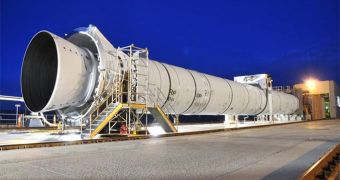As part of Project Constellation efforts, NASA and Alliant Techsystems Inc. (ATK) will soon conduct a new series of test fires with an experimental motor, designed to power up components of America's new space plan.
This will be the first full-sized test of a very large solid rocket motor, a device that follows in the footsteps of a similar propulsion system, that was tested last year.
Experts at NASA say that the Development Motor-2 (DM2) will equip NASA's planned ARES I delivery system, the component of Project Constellation that was supposed to carry the Orion Crew Exploration Vehicle and its astronauts to low-Earth orbit.
But, under US President Barack Obama's budget proposal for 2011, the Orion would be stripped down to a basic version of itself, whereas ARES I would be canceled altogether.
Regardless of what politicians decided, the Project has secured its fundings for this year, and so work will continue as planned at least until December.
The new tests will take place at a Promontory, Utah-based facility, that ATK operates. This is the same test range where the firing of DM-1 took place last September.
According to NASA officials, the new motor will be ignited on August 31, Tuesday, at around 11.05 am EDT (1605 GMT).
The main goal of the maneuver will be to determine how the engine behaves when it's subjected to low temperatures, such as the ones it will encounter in space.
The burn is scheduled to last for about two minutes, during which time about 760 instruments will kee a close eye on 53 test objectives simultaneously.
These are undoubtedly the most heavily instrumented solid rocket motor tests ever conducted at NASA, but the importance of the results justifies this expensive complexity.
But the future is still uncertain for Project Constellation. At this point, it is unclear whether NASA will shut it down, or if congressmen struggling to keep it online will succeed.
If the latter variant turns out to be true, then the Project would remain on scheduled, not falling behind its already0delayed schedule by a single day.
If Obama's plans materialize, then the new technologies developed as part of the current American space plans will be used on other spacecrafts.

 14 DAY TRIAL //
14 DAY TRIAL //